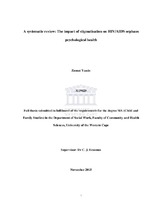A systematic review : the impact of stigmatisation on HIV/AIDS orphans psychological health
Abstract
Since the inception of the HIV/AIDS epidemic, millions of individuals of all ages have been affected. To date, more than 15 million people have died from HIV/AIDS, resulting in a substantial increase in the number of orphans worldwide. AIDS orphans are not spared from the catastrophic outcomes of the virus but rather are critically affected by the presence of familial HIV/AIDS. They have come to be seen as a vulnerable population of the youth who are neglected and ineffectively educated and cared for. Numerous risk factors and outcomes have been identified for AIDS orphans, such as parental bereavement, poverty, financial strain, the loss of educational opportunities, and stigmatisation. Although these risk factors and outcomes may be present among all orphaned youth, AIDS orphans display higher levels of psychological difficulties and distress than youth orphaned by other causes. Scholars have begun to investigate the association of AIDS orphans with a highly stigmatised disease in the hope of uncovering possible explanations. This research has become a challenging task as there is insufficient filtered information examining the effects of HIV-related stigma on the psychological well-being of AIDS orphans. With limited knowledge, it is impossible to accurately illustrate or address the risk that HIV-related stigma poses to the psychological well-being of AIDS orphans. The present study aimed to examine and report on the effects of HIV-related stigma on the psychological well-being of AIDS orphans who have lost one or both of their parents to HIV/AIDS. The study employed a systematic review methodology which identified and critically evaluated relevant literature for inclusion and provided a descriptive meta-synthesis of findings. The review considered studies reporting on the effects of HIV-related stigma on the psychological well-being of AIDS orphans that were published during the period 2004–2015. The review was conducted in four systematic steps. Firstly, potential titles were identified using predetermined sets of keywords in databases available at the University of the Western Cape. Secondly, the abstracts of potential titles were screened for relevance to the study and were promoted to the next level of review. Thirdly, the full text of the studies of all eligible abstracts were retrieved and evaluated for methodological quality using a critical appraisal tool. Eligibility for inclusion was determined by a predetermined threshold score of 80%. Lastly, studies included in the present study were subjected to a process of data extraction. Subsequently, the title search yielded 5473 prospective titles of which 96 titles were identified for possible inclusion. Abstract screening excluded 59 titles, and the differences of 37 studies were included. Critical appraisal of potential studies excluded 28 studies, and the remaining 9 studies were deemed eligible for the purpose of the present study, achieving the threshold score of 80% and above and have been included in the review. The theory explication meta-synthesis and line of argument forming the discussion of findings revealed that AIDS orphans are critically affected by various measures of HIV-related stigma. The central feature extracted from the included studies was the increase of psychological distress and poor psychological functioning of AIDS orphans resulting from HIV- related stigma. Stigma acted to perpetuate poverty, the loss of educational opportunities and the process of bereavement, while leading to an increase in depression, anxiety, post-traumatic stress, conduct disorder, adjustment disorder and delinquency among AIDS orphans. In conclusion, AIDS orphans experienced all measures of HIV-related stigma resulting in an increase of psychological distress accompanied by lower levels of poor-psychological functioning.

